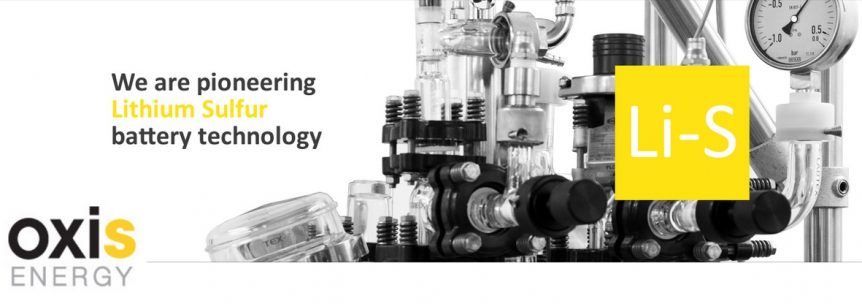That near-mythical 10X (of current lithium cells’ energy density) battery hangs out there on the distant horizon, promising automobiles that can exceed 1,000 miles range, or light aircraft that can carry four at Cessna-like distances. Right now, we have two-place trainers good for an hour’s laps around the circuit, and the hope for improvements soon. OXIS Energy, a UK-based company, has achieved 425 Watt-hours per kilogram at the cell level, and looks to go higher in the near future. Lithium-Sulfur – A Worthy Alternative? Promoters of lithium-sulfur batteries suggest their products have several desirable characteristics and performance boosts that may transcend the limits of lithium-ion cells. Sion Power, for instance, claims availability of their Licerion battery with an even better 500 Watt-hours per kilogram and 1,000 Watt-hours per liter. On the same track, OXIS Energy has announced they have a demonstrated 425 Wh/kg cell, expected to rise to 450 Wh/kg by the end of the year and to 500 by …
Doubling Down on Sulfur
Lithium-sulfur batteries have been off-stage hopefuls, waiting for their chance to strut their stuff – and that time may have arrived, at least in trial performances. Researchers at the Department of WCU Energy Engineering, Hanyang University in South Korea and the Department of Chemistry at the University of Rome, Italy have “demonstrated a highly reliable lithium–sulfur battery showing cycle performance comparable to that of commercially available lithium-ion batteries while offering more than double the energy density.” The team, led by a group from Hanyang University, designed a lithium-sulfur cell using “a highly reversible dual-type sulfur cathode (solid sulfur electrode and polysulfide catholyte) and a lithiated Si/SiOx nanosphere anode.” Their paper in the ACS journal Nano Letters reported that their cell showed “superior battery performance in terms of high specific capacity, excellent charge–discharge efficiency, and remarkable cycle life,” The cell delivered ∼750 mAh g–1 over 500 cycles (85-percent of the initial capacity). Researchers suggested these “behaviors” may result from “a synergistic effect of the …
400 Watt-Hours per Kilogram by 2014
On its web site, the company boasts, “OXIS Energy is leading the World with its latest cell Energy Density and Capacity,” and proceeds to announce that it’s “developed its largest Lithium Sulfur cell achieving in excess of 300 [Watt-hours per kilogram]. This outperforms Lithium ion technology that has dominated the performance battery market for many years. In addition OXIS has achieved an increase in cell capacity to a 25 Amp-hour (Ah) cell – a world first.” They’re working toward a 33Ah cell. Claiming a twelve-fold improvement in the last 18 months, OXIS, a British battery manufacturer, says it has the confidence to “achieve a cell capacity of 33Ah by mid 2015.” The firm has hopes of energy densities “in excess of 400Wh/kg by the end of 2016 and in excess of 500Wh/kg by the end of 2018.” This doubling of energy density over the best of available lithium-ion batteries now would make the 175-mile-range Nissan Leaf a reality, and bring …

